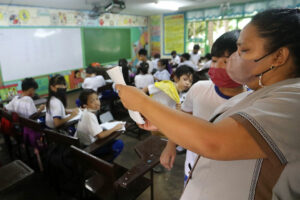THE GOVERNMENT should encourage investment in schools by charging affordable tuition to improve access to education, a congressional think tank said.
The Congressional Policy and Budget Research Department (CPBRD) said in a report: “Encouraging conglomerates to invest in low-fee schools and bring their presence in areas where there are limited basic private schools may have the potential to effectively augmenting access to… quality education.”
“Government partnership with low-fee schools may also attract more low-income families to consider transferring their children to private schools,” it added.
The government is spending around P32 billion per year in private school subsidies under the Expanded Government Assistance to Students and Teachers in Private Education (E-GASTPE) program, providing low-income learners access to quality education, according to the paper.
Filipino students were among the world’s weakest in math, reading, and science, according to the 2022 Program for International Student Assessment. The Philippines ranked 77th out of 81 countries and performed worse than the global average in all categories.
However, students enrolled in private schools fared significantly better compared to public school students, the CPBRD said.
“The contribution of the private education becomes even more increasingly significant in light of the government’s limited fiscal space to ensure the provision of full access to quality education,” it said.
Encouraging low-income families to enroll their children in private schools requires the government to support the development of low-fee schools via subsidies.
“Quality low-fee schools can be prioritized by the government as grantees of ESC (Educational Service Contracting) and VP (Voucher Programs), subject to standard qualification requirements,” it stated.
“Continuous development and government support to the private education sector are indispensable in the promotion… (of) greater access to quality education,” it added.
The government should also look at exploring public-private partnerships to support further improvement in the education sector.
“The government may also explore and consider other forms of complementary partnership with private education which are not limited to direct subsidies to students, teachers, and schools,” according to the CPBRD. — Kenneth Christiane L. Basilio

